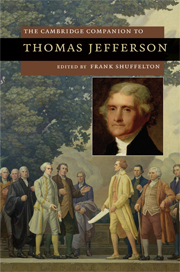Book contents
- Frontmatter
- Introduction
- 1 The Declaration of Independence and the new nation
- 2 Jefferson’s conception of republican government
- 3 Notes on the State of Virginia and the Jeffersonian West
- 4 Jefferson and Native Americans: policy and archive
- 5 Race and slavery in the era of Jefferson
- 6 Jefferson’s people: slavery at Monticello
- 7 Jefferson, science, and the Enlightenment
- 8 Thomas Jefferson and the creation of the American architectural image
- 9 The politics of pedagogy: Thomas Jefferson and the education of a democratic citizenry
- 10 Jefferson and religion: private belief, public policy
- 11 Jefferson and the language of friendship
- 12 Jefferson and Adams: friendship and the power of the letter
- 13 The resonance of minds: Thomas Jefferson and James Madison in the republic of letters
- 14 Jefferson and the democratic future
- Further reading
- Index
1 - The Declaration of Independence and the new nation
Published online by Cambridge University Press: 28 May 2009
- Frontmatter
- Introduction
- 1 The Declaration of Independence and the new nation
- 2 Jefferson’s conception of republican government
- 3 Notes on the State of Virginia and the Jeffersonian West
- 4 Jefferson and Native Americans: policy and archive
- 5 Race and slavery in the era of Jefferson
- 6 Jefferson’s people: slavery at Monticello
- 7 Jefferson, science, and the Enlightenment
- 8 Thomas Jefferson and the creation of the American architectural image
- 9 The politics of pedagogy: Thomas Jefferson and the education of a democratic citizenry
- 10 Jefferson and religion: private belief, public policy
- 11 Jefferson and the language of friendship
- 12 Jefferson and Adams: friendship and the power of the letter
- 13 The resonance of minds: Thomas Jefferson and James Madison in the republic of letters
- 14 Jefferson and the democratic future
- Further reading
- Index
Summary
On July 2, 1776 the news that “the CONTINENTAL CONGRESS declared the UNITED COLONIES FREE and INDEPENDENT STATES” appeared in the Pennsylvania Evening Post beside a notice about a local man who had declared his own independence. Ishmael, “twenty-five years of age, above six feet high, strong made, his colour between a Mulatto and a Black,” ran away from his Philadelphia owner despite being “somewhat lame, occasioned by his having his thigh bone broke when a boy.” The newspapers and state papers of the American Revolution made impassioned declarations about liberty and property, setting the stage for a civil war in the language of rights acted out by and upon unfree individuals like Ishmael. Modern readers cannot miss the proximity of liberty to slavery in the new nation, but would contemporaries have connected a slave's escape with the resolution that Congress passed on July 2 or with the Declaration explaining that resolution approved on July 4, published in the same newspaper on July 5, and celebrated in Philadelphia and elsewhere on July 8? More importantly, would Ishmael? To ask such questions is to confront a powerful narrative about the changing meaning of the Declaration of Independence. Scholars once confidently equated the Declaration with the statements that “all Men are created equal, that they are endowed by their Creator with certain unalienable Rights, that among these are Life, Liberty, and the Pursuit of Happiness.” But since the 1960s, and with increasing persuasiveness in book-length studies by historians Pauline Maier and David Armitage, scholars have contended that the self-evident truths of the second paragraph, so familiar to modern readers, did not constitute the core of the Declaration to contemporaries.
- Type
- Chapter
- Information
- The Cambridge Companion to Thomas Jefferson , pp. 12 - 34Publisher: Cambridge University PressPrint publication year: 2009
- 4
- Cited by

